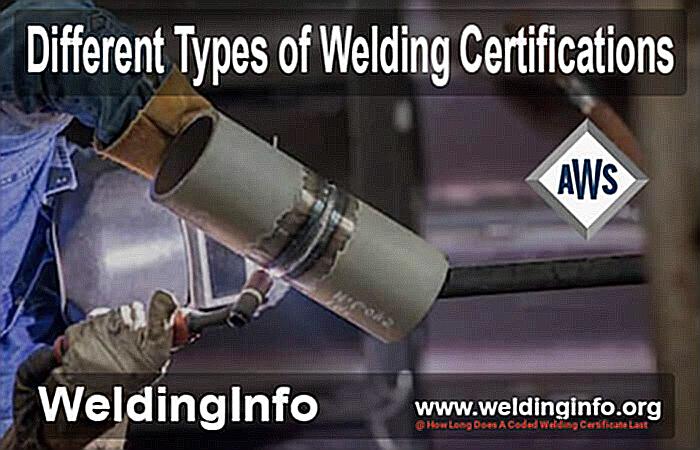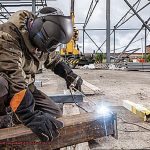Welcome to our newest blog post, where we will be exploring the duration of a coded welding certificate.
Whether you are a seasoned welder or new to the industry, knowing the validity period of your certification is essential for maintaining your professional qualifications. In this article, we will delve into the definition of a coded welding certificate and the reason behind its limited lifespan.
So, put on your welding helmet and join us as we delve into this crucial topic.
How Long do American Welding Society (AWS) Welding Certifications Last?
Contents
Aspiring welders must undergo extensive training to acquire the necessary skills and knowledge to excel in their field. One way for welders to showcase their proficiency is by obtaining a welding certification from an accredited organization, such as the American Welding Society (AWS). However, many wonder about the duration of these certifications and what steps are required to maintain their active status. Let’s delve into the details.
According to AWS standards, welding certifications are valid for three years from the date of issuance. This means that after three years, the certification expires, and welders must recertify to keep their certification active. Recertification involves retesting or participating in training programs to ensure that welders’ skills and knowledge are up-to-date with industry standards.
It’s worth noting that the duration of a coded welding certificate may vary depending on the type of certification and the issuing body. Some certifications may have longer validity periods, such as 5 years, while others may expire within 6 months. Therefore, it is crucial for welders to keep track of their certification expiration dates and renew them before they expire to avoid any disruptions in their work.
The validity of a coded welding certificate is determined by industry standards set by organizations like AWS, IIW, and ASME. These standards consider the intricacies of welding processes and techniques used in different industries. For instance, a certification for TIG welding may have a longer validity period compared to a certification for basic welding.
However, it’s essential to remember that a certification’s expiration date doesn’t necessarily mean that a welder’s skills and knowledge are no longer valid. With advancements in technology and changes in industry standards, it is vital for welders to continuously update their skills through training or retesting to maintain the certification’s validity.
How do I Verify a Welding Certificate?
In this compelling blog post, we will present a comprehensive guide on how to authenticate a welding certificate.
Phase 1: Identify the Accreditation Agency
The initial step in verifying a welding certificate is to identify the accreditation agency that issued it. This could be AWS, ASME, NCCER, or other organizations. Each entity has its own intricate set of criteria and prerequisites for distributing certifications, making it crucial to confirm which agency issued the certificate.
Phase 2: Check for Validity
Once you have determined the accreditation agency, the next step is to check if the certificate is still valid. Most coded welding certificates have an expiration date that can vary from 6 months to 10 years, depending on the type and level of certification. To validate the certificate’s legitimacy, you can directly contact the accreditation agency or visit their website for a list of valid certifications.
Phase 3: Verify Code or Standard Number
It’s also essential to verify the code or standard number stated on the certificate. This number indicates the specific code or standard that the welder has been certified in, such as AWS D1.1 for structural steel welding or ASME Section IX for pressure vessel welding. By examining this code, you can ensure that the welder’s certification is applicable to the type of welding required for your project.
Phase 4: Confirm Expiration Date
Do not forget to confirm the expiration date of the certificate. If it has expired, the welder may need to undergo recertification to maintain their qualification. Some accreditation agencies offer online databases where you can search for a welder’s name and authenticate their current certification status and expiration date.
What are The Different Levels of Welding Certificates?
As someone who is well-versed in the world of welding certifications, I know how daunting it can be to navigate the different levels available. If you’re considering a career in welding, you may be wondering about the various levels of certificates offered by the American Welding Society (AWS). Allow me to guide you through each level and what it takes to obtain them.
The AWS offers certifications for both welders and educators, with different levels depending on your education and work experience. Let’s take a closer look at each level and what they entail.
Entry Level Certifications
If you’re just starting your welding journey, don’t worry – the AWS has entry-level certifications that require little to no prior education or work experience. These are perfect for high school graduates or individuals looking to switch careers and enter the welding industry.
The Certified Welder (CW) certification is the most basic level and only requires six months of welding experience or a combination of education and experience. This certification covers three welding processes: shielded metal arc welding (SMAW), gas tungsten arc welding (GTAW), and gas metal arc welding (GMAW).
For those with a high school diploma or equivalent, the Certified Welding Fabricator (CWF) certification is also available. This certification recognizes your skills in preparing, fabricating, and inspecting welds according to industry codes and standards.
Advanced Level Certifications
For those with more experience and education in welding, the AWS offers advanced level certifications that can lead to higher-paying positions in the industry.
The highly sought-after Certified Welding Inspector (CWI) certification requires a minimum of three years of work experience or a combination of education and experience. With this certification, you can inspect and certify welds according to industry codes and standards.
If you have a bachelor’s degree in engineering or a related field, you can also obtain the Senior Certified Welding Inspector (SCWI) certification.
Is A Welding Certificate Worth It?
Welding is an essential and sought-after skill in various industries, including construction, manufacturing, automotive, and aerospace. With the growing demand for skilled welders, many individuals are considering obtaining a certification. But the question remains: is a welding certificate worth it? Let’s delve into the world of welding certifications to find out.
Types of Welding Certifications
The American Welding Society (AWS) offers various welding certifications, each catering to different levels of expertise and responsibilities. These include:
Certified Welder (CW)
This entry-level certification is suitable for individuals with basic welding skills and knowledge. To acquire this certification, one must pass a written and practical exam on welding fundamentals and one specific welding process.
Certified Welding Inspector (CWI)
This advanced certification is for those with extensive knowledge and experience in welding. The requirements include passing a written exam on welding codes, standards, and practical applications, as well as having at least three years of work experience.
Certified Welding Supervisor (CWS)
This certification targets individuals who supervise welding operations and ensure compliance with industry standards. To obtain this certification, one must have at least five years of work experience and pass a written exam on welding supervision, codes, and standards.
Certified Welding Educator (CWE)
This certification is for educators teaching welding techniques and processes. The requirements include having at least five years of work experience and passing a written exam on teaching methods, safety, and welding theory.
Benefits of Obtaining a Welding Certification
Increased Job Prospects
A welding certification can set you apart from other applicants in the job market, increasing your chances of employment. It showcases your skills and knowledge to potential employers.
Higher Earning Potential
Certified welders often earn higher salaries than non-certified welders. With a certification, you have proof of your expertise and can negotiate for a higher salary.
Conclusion
In conclusion, we have delved into the world of coded welding certificates and discovered their significance in maintaining professional qualifications. As we now know, these certifications are valid for three years from the date of issuance and require renewal through retesting or training programs to ensure that welders’ skills and knowledge are up-to-date with industry standards.
We also discussed the crucial steps to verify a welding certificate, including identifying the accreditation agency, checking for validity, verifying the code or standard number, confirming the expiration date, and following up with the agency. These steps are essential in guaranteeing that a welder’s certification is legitimate and applicable to their work.
Furthermore, we explored the various levels of welding certifications offered by organizations like AWS and their specific requirements. From entry-level certifications for beginners to advanced credentials for experienced welders, these certifications can open doors to higher-paying positions in multiple industries.
And now onto the burning question: is a welding certificate worth it? The resounding answer is yes. With increased job opportunities and potential for higher earnings, obtaining a certification can set you apart from other applicants and showcase your expertise in this vital skill.
So whether you’re embarking on your welding journey or seeking career advancement in this field, investing in a coding welding certificate is undoubtedly worth it. Keep learning and honing your skills to stay current with industry standards and maintain your certification’s validity.





